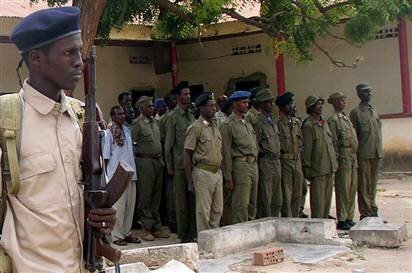 The offensive has been planned for months and has been postponed repeatedly, but questions remain about whether it can bring long-term security in a country suffering from almost two decades of conflict.
The offensive has been planned for months and has been postponed repeatedly, but questions remain about whether it can bring long-term security in a country suffering from almost two decades of conflict.
It is still unclear when the offensive will begin or what it will entail. Somali forces are hampered by a lack of equipment, late paychecks, and some complain they do not even have enough food.
“There is nothing the government has done but survive,” said Mogadishu resident Sheik Mohamud Abdulle. “We have been hearing of late the government’s threat to the rebels, but we expect little from any military action as long as its soldiers are not regularly paid.”
Nevertheless, Somalia’s president and state defense minister have both asserted in recent days that Somali troops – many of whom were trained outside the Horn of Africa nation – are ready. Somali officials have pleaded with the international community to help defeat militants, saying they pose a threat to world security.
“Our soldiers have made their final preparations to deal with the security and will soon take action,” Yusuf Mohamed Siyad, Somalia’s state defense minister, who assists the defense minister, told The Associated Press this week. But, he complained, “the international community has done little to support the government financially.”
Many countries have pledged funds for Somalia’s security services but are reluctant to release money until they are sure paychecks will not be stolen by commanders. Other militias allied to the government want their slice of the cash, but are reluctant to sign up to a central command.
The lack of funds has hurt troops.
One soldier, Osman Mohamed Dalaal, a recruit at Camp Jizira in Mogadishu, where the bulk of the pro-government fighters are staying, told The Associated Press the men there were getting only two meals a day and that morale was low because they were not regularly paid.
A security official and a diplomat told the AP that around 500 fighters who were trained in Djibouti were also in the camp, although two diplomats said some of the men needed further training and they all needed regular pay and more equipment. They spoke on condition of anonymity because they weren’t authorized to speak to the media.
The planned offensive comes amid rising concern over Islamic militancy in the region. Somalia is half a day’s boat ride from Yemen, where the U.S. is ramping up aid to help the government fight al-Qaida in the Arabian Peninsula, the group tied to a Nigerian man who has been charged with trying to blow up a Detroit-bound airliner on Christmas Day.
One of the diplomats said recent fighting in Yemen between militants and the government has driven dozens of Yemeni Islamists into Somalia the past few weeks.
In Somalia, the offensive is planned against al-Shabab, Islamists with ties to al-Qaida. The country has seen an influx of foreign fighters the last two years. The government relies on around 5,000 African Union peacekeepers to control its only territory, a few square miles (kilometers) of Mogadishu. The AU forces will provide support for the offensive.
There are superficial signs the government would like the operation to launch soon. Somali flags have been painted on armored vehicles in Mogadishu and a government-controlled radio station has been asked to find patriotic music to play during the offensive.
The offensive follows an influx of foreign Islamist fighters from countries as diverse as the U.S., Pakistan, Algeria, Yemen and Iraq into Somalia over the past two years.
Even if the offensive succeeds, it is unclear if the government can hold the territory takes or use its position to seek a more durable political solution to the conflict.
—
Associated Press writer Malkhadir M. Muhumed in Nairobi, Kenya, contributed to this report. Katharine Houreld reported from Nairobi.






